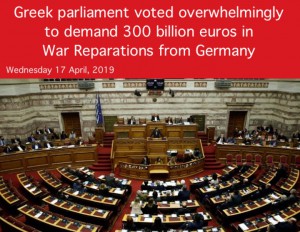GERMANY HAS WELCHED ON ITS MORAL OBLIGATIONS BEFORE
 President Trump and several of his administration’s officials have recently pointed out that Germany has been shirking its 2 percent of GDP defense budget target agreed to as recently as 2014. To be sure, Germany is not the only European nation which chooses to finance national defense on the cheap. Clearly, it is a great comfort to the Europeans that the United States watches their backs, while picking up the tab on roughly 22 percent of NATO’s expense budget.
President Trump and several of his administration’s officials have recently pointed out that Germany has been shirking its 2 percent of GDP defense budget target agreed to as recently as 2014. To be sure, Germany is not the only European nation which chooses to finance national defense on the cheap. Clearly, it is a great comfort to the Europeans that the United States watches their backs, while picking up the tab on roughly 22 percent of NATO’s expense budget.
As the largest economy on the continent, however, one might expect a less tightfisted commitment than the current 1.3 percent of GDP which Germany spends on defense. This is a puny sum indeed. In fact, on a per capita basis, Germany spends no more on defense than does the economic basket case that is Greece. Incidentally, as impoverished as the nation of Greece is, it is one of only four countries of the NATO alliance that does meet its 2 percent obligation.
The niggardly German defense budget has onerous security consequences: fewer than half of Germany’s fighter jets are able to fly their missions for lack of parts, and German soldiers are moved to hide their army’s lack of materiel by using broomsticks in lieu of non-existing heavy machine guns during war games. The German argument for its lack of financial commitment to NATO’s defense is as specious as it is creative. It goes something like this: national defense goes beyond military spending. Some types of development aid, the German government says, should count as defense spending. In a nutshell, this is a way of saying that the harboring of more than a million Syrian and other Middle Eastern refugees is tantamount to protecting Europe’s borders!
DOES DEVELOPMENT AID INCLUDE WW II REPARATIONS?
It is curious that Germany’s apparent magnanimity does not extend to owning up to the disaster and carnage it caused with its aggressive militarism during the better part of the 20th century. Greece represents a tragic case in point.
During WW II, Greece lost more lives than the United States and the United Kingdom combined. Roughly, ten percent of the population of Greece – in excess of 500,000 souls – perished at the hands of the Butchers of Berlin largely through executions or the famine caused by the destruction of crop fields and animal stock. What is more, the Nazis looted Greek banks, took out sham loans, and confiscated all of the available gold, silver, nickel, and copper in the nation.
The Nazis destroyed houses, farms, public buildings, schools, hospitals, ports, canals, roads, train tracks, and bridges. Similarly, most Greek shipping and all telephone communications were destroyed. In addition, over 1,700 villages were burned to the ground many with the elderly, women, and children hunkered down in their infernal dwellings unable to escape. Beyond these atrocities, the Nazis appropriated much of Greece’s antiquities from a number of public and private museum collections as well as from archeological sites. German officers, and before them Italian soldiers of one stripe or another, had a field day boxing and crating antiquities which they then shipped back to their countries of origin. Antiquities which could not be carted off, were wantonly destroyed as to preclude any possible restoration.
The German devastation was so complete that Greece became devoid of the infrastructure, the institutions, and the systems, essential to properly function as a modern nation. In the aftermath of the war, Greece predictably descended into civil war, chaos, and more death. The de-Hellinization of the country was now complete.
WHO OWES WHAT TO WHOM?
It is clever double-dealing that Germany, in league with the Troika – the triumvirate of the European Commission, the International Monetary Fund, and the European Central Bank – dishes out a crippling dose of austerity and browbeats the small nation on the international stage to meet its loan commitments while it steadfastly refuses to acknowledge its own obligations. We have seen this movie before: Germany made its last payment to American claimants of WW I reparations in 2010.
In 2015, Deputy Minister of Foreign Affairs, Mr. Dimitris Mardas, announced that Greece is owed roughly $305 billion according to calculations made by the country’s general accounting office. This is a sum that includes actual damages, interest, and inflation. This marks the first time the reparations claim has been formalized with such precision and it’s entirely credible. The Germans, of course, have scoffed at the notion that any monies are due inasmuch as there is no strict legal basis on which Greece can press its claim.
The key, however, is whether the Holocaust visited on the Greeks by its Nazi occupiers hinges on legal niceties or on the moral and ethical behaviors expected of civilized nations. Ironically, Germany was the principal beneficiary of moral largesse as approximately two-thirds of its war indebtedness, much of it provided by the Marshall Plan, was forgiven. If ever you wondered what explains the German economic “miracle” in the aftermath of the war this is a good place to start looking.
President Trump and his administration should not fall prey to Germany’s dilatory approach to meeting its financial commitments to NATO. If the Germans are not concerned about staring down the barrel of a Russian tank the United States should not be either.

Raul Pupo - Author (source)






